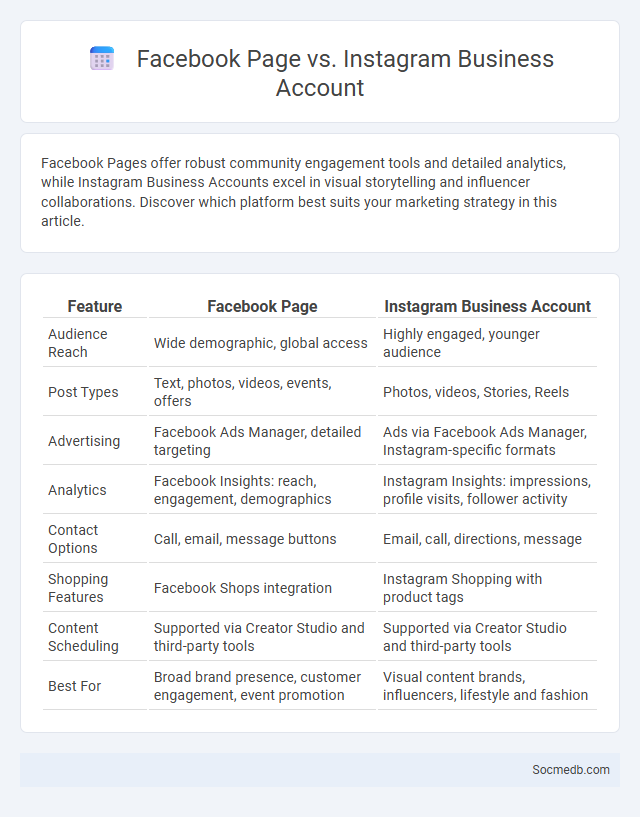
Photo illustration: Facebook Page vs Instagram Business Account
Facebook Pages offer robust community engagement tools and detailed analytics, while Instagram Business Accounts excel in visual storytelling and influencer collaborations. Discover which platform best suits your marketing strategy in this article.
Table of Comparison
| Feature | Facebook Page | Instagram Business Account |
|---|---|---|
| Audience Reach | Wide demographic, global access | Highly engaged, younger audience |
| Post Types | Text, photos, videos, events, offers | Photos, videos, Stories, Reels |
| Advertising | Facebook Ads Manager, detailed targeting | Ads via Facebook Ads Manager, Instagram-specific formats |
| Analytics | Facebook Insights: reach, engagement, demographics | Instagram Insights: impressions, profile visits, follower activity |
| Contact Options | Call, email, message buttons | Email, call, directions, message |
| Shopping Features | Facebook Shops integration | Instagram Shopping with product tags |
| Content Scheduling | Supported via Creator Studio and third-party tools | Supported via Creator Studio and third-party tools |
| Best For | Broad brand presence, customer engagement, event promotion | Visual content brands, influencers, lifestyle and fashion |
Introduction to Facebook Page and Instagram Business Account
A Facebook Page serves as a professional profile designed for businesses, brands, and public figures to connect with their audience, offering tools for content sharing, advertising, and analytics. An Instagram Business Account provides access to insights, advertising options, and contact information, enabling businesses to promote products and engage with followers effectively. Both platforms integrate features that enhance brand visibility, customer interaction, and marketing strategy optimization.
Key Features of Facebook Page
Facebook Pages offer customizable templates to tailor your business or brand's online presence, featuring sections such as Services, Reviews, and Events to engage your audience effectively. Robust analytics tools provide insights on Reach, Engagement, and Follower demographics, empowering you to optimize content strategy. You can schedule posts, manage community interactions through comments and messages, and utilize call-to-action buttons to drive conversions and grow your online impact.
Key Features of Instagram Business Account
Instagram Business Accounts offer key features such as detailed insights on follower demographics, engagement metrics, and post performance to optimize marketing strategies. Access to Instagram Shopping allows businesses to tag products directly in posts and stories, enhancing e-commerce opportunities. Tools like promoted posts, call-to-action buttons, and contact options improve customer interaction and boost brand visibility on the platform.
Similarities Between Facebook Page and Instagram Business Account
Facebook Pages and Instagram Business Accounts both offer tools for brands to engage with their audience through targeted content sharing and analytics. Each platform supports advertising, insights on follower demographics, and messaging features to enhance customer interaction. You can manage advertising campaigns and track performance metrics seamlessly across both accounts through Facebook Business Suite.
Differences in Audience Engagement
Audience engagement on social media varies significantly across platforms due to differences in content formats, user demographics, and interaction styles. Instagram favors visually-driven engagement with high likes and comments on images and videos, while Twitter emphasizes real-time conversations and shares around trending topics. You can maximize your social media impact by tailoring content to match the unique engagement patterns of each platform's audience.
Content Strategy: Facebook vs Instagram
Facebook content strategy prioritizes diverse formats including text posts, videos, and groups to foster community engagement, leveraging its broad demographic reach of over 2.9 billion active users. Instagram content strategy emphasizes visually-rich imagery, short videos like Reels, and Stories to capture the attention of primarily millennials and Gen Z audiences, with a focus on brand aesthetics and influencer collaborations. Tailoring content to each platform's unique algorithm and user behavior enhances visibility and drives higher engagement rates for marketers and brands.
Advertising and Promotion Capabilities
Social media platforms offer advanced advertising and promotion capabilities, enabling businesses to target specific demographics through detailed user data and behavioral analytics. Tools like Facebook Ads and Instagram Sponsored Posts facilitate precise audience segmentation, real-time campaign optimization, and comprehensive performance tracking. Enhanced features such as influencer partnerships and interactive content formats further amplify brand visibility and engagement across diverse digital channels.
Analytics and Insights Comparison
Social media analytics tools provide a comprehensive comparison of engagement metrics, follower growth, and content performance to help you optimize your strategy. By leveraging insights such as reach, impressions, and audience demographics, you can tailor campaigns to maximize ROI effectively. Accurate data analysis enables your brand to stay competitive and make informed decisions based on real-time social media trends and user behavior.
Choosing the Right Platform for Your Business
Selecting the ideal social media platform for your business requires understanding your target audience's demographics and behavior on channels like Instagram, LinkedIn, or TikTok. Your choice should align with your marketing goals, whether it's brand awareness, lead generation, or customer engagement. Prioritize platforms where your content resonates and drives measurable customer interaction to maximize return on investment.
Conclusion: Which Platform Suits Your Needs?
Choosing the right social media platform depends on your specific goals, target audience, and content type. Instagram excels for visual storytelling and influencer marketing, while LinkedIn is ideal for professional networking and B2B engagement. Facebook offers broad reach and diverse demographic engagement, making it versatile for brands seeking wide visibility.
 socmedb.com
socmedb.com